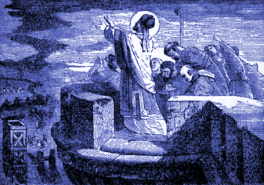Lives of the Saints
Our Models and Protectors
Spiritual Bouquet:
July 11

Saint James
Bishop of Nisibis and
Doctor of the Syrian Church
(† 350
This eminent Saint and glorious Doctor of the Syrian Church was a native of Nisibis, a city near the border of the Roman Empire and Persia. In his youth, entering the world, he trembled at the sight of its vices and the slippery downhill path of its pleasures. He thought it wise to adopt retirement, that he might gain strength and afterwards be better able to stand his ground in the field. He therefore chose the highest and most inaccessible mountain for his dwelling place, with a cave for shelter in winter, while for the rest of the year he lived in the forest, continually exposed to the open air. Notwithstanding his desire to live unknown to men, he was discovered. He was highly favored with the gifts of prophecy and miracles, and many were not afraid to climb the rugged rocks that they might recommend themselves to his prayers, and receive the comfort of his spiritual advice.
After a number of years he left his solitude to enter Persia, where he knew that there was a virtually infinite multitude of idolaters. There his prayers wrought miracles which changed the attitude of a considerable number. When he returned to Nisibis, he found the bishop's palace vacant after the death of the prelate. The clergy and people unanimously chose Saint James to replace him, overcoming his humility by their persistent persuasion.
One day, as the bishop was traveling, he was accosted by a gang of beggars intending to extort money from him under the pretext of having to bury one of their companions. The latter had stretched out on the ground as though dead. The holy man gave them what they asked, and offering up supplications to God as for a soul departed, he prayed that His Divine Majesty would pardon that man the sins he had committed while he lived, and admit him into the company of the Saints. As soon as the Saint had passed on, the beggars called out to their companion to get up and receive his share of the booty. How amazed they were to find him genuinely dead! Seized with sudden fear and grief, they cried out in the utmost consternation and immediately ran after the man of God, casting themselves at his feet and confessing their fraud. They begged his forgiveness and besought him by his prayers to restore their unhappy companion to life, and this the Saint did.
The most famous miracle of our Saint was that by which he protected his native city from the barbarians. Sapor II, the haughty King of Persia, was besieging Nisibis with the whole strength of his empire while Saint James was its bishop. The prelate would not pray for the destruction of anyone, but implored divine Mercy that the city might be delivered from the calamities of so terrible a siege. Then, going to the top of a high tower and turning his gaze towards the enemy, he looked down upon the prodigious multitude of men and beasts, covering the whole country. He prayed, Lord, Thou art able by the weakest means to humble the pride of Thy enemies; defeat these multitudes by an army of gnats. God heard the humble prayer of His servant. He had hardly finished speaking these words, when whole clouds of gnats and flies came pouring down upon the Persians, entering into the elephants' trunks and the horses' ears and nostrils. The animals chafed and foamed and threw their riders, and the entire army was cast into confusion and disorder. A famine and pestilence followed and carried off a great number of the invaders. The King of Persia, after remaining more than three months before the walls, set fire to all his engines of war and abandoned the siege; he retreated, having lost twenty thousand of his men.
When Sapor was again repulsed from outside the walls of Nisibis in 359, he turned his arms against the neighboring city of Amidus, seized that stronghold, and put the garrison and most of the inhabitants to death by the sword. The citizens of Nisibis attributed their preservation from this second attack to the intercession of their glorious patron, Saint James, although he had already gone to his reward. He died in the year 350.
Little Pictorial Lives of the Saints, a compilation based on Butler's Lives of the Saints, and other sources by John Gilmary Shea (Benziger Brothers: New York, 1894); Les Petits Bollandistes: Vies des Saints, by Msgr. Paul Guérin (Bloud et Barral: Paris, 1882), Vol. 8